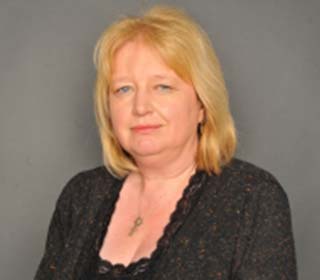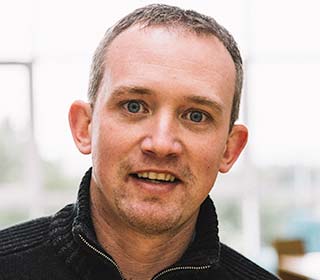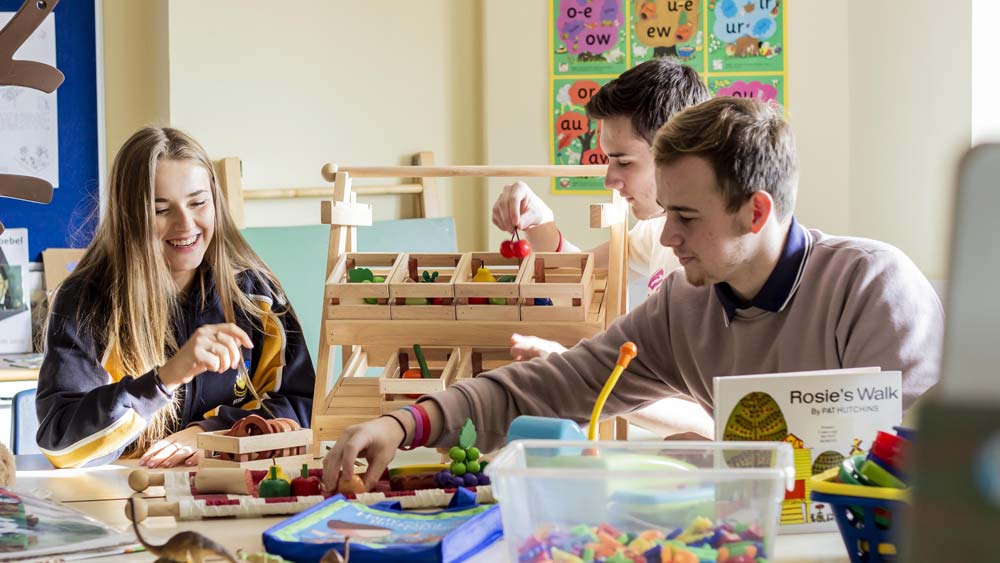
BA (Hons) Primary Education
Learn about the complex forces that shape the world of primary education within the UK and International contexts. You will explore primary education through a theoretical lens, and also engage in practice through a range of projects and placement activities. This degree is the perfect foundation for progressing to initial teacher training in the primary sector, and we are there to help you every step of the way.


Rated 92% for academic support
National Student Survey 2024

Keep in touch with this course
Entry requirements
Three A-levels at grades CCC - BBC
Or BTEC triple grades MMM - DMM
Access to HE Diploma accepted with credits in line with UCAS tariff point range
T Level - Pass (C and above) - M DBS check required
GCSE English Language Grade C or 4 or an acceptable equivalent qualification
We are committed to safeguarding and promoting the welfare of children and students. All students are expected to share this commitment and demonstrate consistently high standards of personal and professional conduct.
We are committed to safeguarding and promoting the welfare of children and students. All students are expected to share this commitment and demonstrate consistently high standards of personal and professional conduct.
We will accept 2 AS levels in lieu of one A level but must be accompanied by 2 A Levels or BTECs (General Studies is excluded).
UCAS points 96-112
UCAS code X321
UCAS institution code P63
Duration Three years full-time or up to six years part-time
Any questions?
Contact Charley, our Applicant Support Coordinator, if you have any questions. Email: applicantsupport@marjon.ac.uk and Charley will get back to you!
Course Summary
BA (Hons) Primary Education is for students who are interested in the world of young people, how they learn and how education systems support their development. The course offers the opportunity to critically examine and question current education systems (nationally and internationally), their historical roots and the profound effect that culture and society have on the lives of young people. It also enables you to develop knowledge of the broad and complex issues that children face and how educators support them in their learning.
Education is no simple matter, and on this course you unpick many of the controversies related to curriculum, inclusion, creativity, and the nature of teaching. You explore in detail how children learn and develop, how they acquire language, become competent learners, learn to socialise, as well as how they participate and behave within school contexts.
BA (Hons) Primary Education is ideal if you are considering a career in primary education, and it caters to students from a wide range of backgrounds. So, whether you are a school or college leaver, or if you are a mature student and have already been working in the education sector, this course can take you one further step towards achieving your professional goals.
There are numerous opportunities to engage in practice, working alongside children in projects and on placement. These experiences allow you to reflect on the nature of practice, how children learn, and what you are like as a professional in education. Working collaboratively with your peers, or on individual and personalised placements that you help facilitate, you develop skills in planning, managing time, communicating information, and producing digital resources.
The course comes to fruition with an independent research project in your third year and our annual education conference provides an opportunity to share research, and outcomes from the range of learning experiences you take part in.
Why this course at Marjon?
Sets you up perfectly for postgraduate teacher training
Readies you for teaching or a related profession
Partnerships with hundreds of schools across the South West and London
Learn about the complex and multifaceted world of education and the experiences of children
Work with practising teachers on your modules, giving you an insight into the realities of the classroom
An enrichment programme with practising teachers to learn about exciting new initiatives in the primary curriculum
Modules for this course
Course Snapshot
“ Year 1 introduces a wide range of keystone education philosophies and theories. We explore the nature of education, research and politics, along with the psychology encompassing learning and child development. We start developing as reflective practitioners though work placement experience. Year 2 furthers our knowledge and understanding of education; studying young people, their families and the communities in which they exist. More placements see us apply our academic knowledge within a range of settings. Year 3 brings all of our knowledge, understanding and experience together. We develop our own identities as practitioners; we consider how our own values and beliefs shape us. We plan for the exciting career journeys ahead of us”
1st Year
Educational themes and concepts
Creative & inclusive practice
Schools & learning environments
Child development
Children's literature and drama
Engaging with practice
2nd Year
Critical enquiry into primary mathematics
Learning in the outdoors
Education and sustainability
Ideas, theories and paradigms
Learning & teaching
Experiential placement
Educational research
3rd Year
Professional learning in context
Personal philosophy of education
Quality & leadership in education
Supporting children & young people
Education project
Current students say...
Shannon Robertson
"Marjon has helped me to become confident within myself and has helped me to become a better person. I have developed so much in the last three years and I can now safely say I hope to teach for the rest of my life."
Ben Morgan
“I have really enjoyed the opportunity to discuss ideas with my lecturers and my fellow students. The fact that my lecturers come from a range of educational backgrounds means lots of different opinions are visible to me. This course has allowed me the opportunity to develop my skills for teaching children and learning about how children learn best. I am hoping to teach English as a foreign language in Asia and feel more sure of my philosophy of education as a result of this course.”
This course is perfect if you’re curious about
Why our education system is the way it is
How children learn and develop throughout their school lives
What children learn in school and how this is done successfully
What it is like to be in a primary classroom and working with primary-aged children
How teachers and other professionals practice effectively
How education may develop in the future
See where our graduates are now
Chloe Hazell
“BA Primary Education teaches you how to teach, not what to teach. Theories are presented to you by lecturers who are passionate and want to know you to help you achieve. You are given time to reflect, discuss, critique, practice and observe in order to develop your own beliefs and methods for how to teach. I would not be the trainee teacher I am now without the lecturers and this course.”
Chloe is now a Newly Qualified Teacher (NQT) working in a primary school
Jemma Joakim
“The course was extremely interesting and broad, teaching a wide range of subjects relating to education. This allowed me to develop my critical thinking skills and focus on areas of personal interest, leading me to pursue a career in academia. The tutors were highly knowledgeable, supportive and approachable. I’m now studying the Education Master’s at Marjon with a view to starting a PhD. This course was very enjoyable, reinforcing and extending my ardent interest in educational matters.”
Jemma is now studying for a Master's degree
How you’ll be taught and assessed?
How will you be taught?
Teaching combines lectures and seminars with lots of practical activities and experiences. So, in a typical day, you may well have a lecture on an aspect of educational theory and also be designing a learning activity for a school-based project.
How will you be assessed?
Our assessment is broad and diverse on the programme, giving everyone the chance to shine. Posters, blogs, presentations, essays, practicals, debates: this variety helps you develop your skills and apply your learning in meaningful ways.

Selina Day is a qualified teacher who has extensive experience working within the primary sector. She is the programme lead for BA Primary Education and lecturers within the Institute of Education and School of Arts and Humanities. At the university she is involved in various activities that sit outside her programme and school responsibilities. She is member of SCION (Sustainability, Creativity and Innovation) research group and has been a chair of governors at a local Plymouth school. Currently Selina is a member of the First Federation Academy Trust. As well as her academic role at the university, she is undertaking her PhD in the area Contemporary Children’s Literature and Religious Education.
Fees and funding
Fees UK students: £9,790 per annum
This fee covers your tuition and access to course-specific equipment and facilities, as well associated services including access to the library, study skills support, IT support, student support and wellbeing services and membership of the Student Union. There may be additional costs by course.
Funding available for this course
Our Student Funding Advisors offer confidential and impartial advice about your funding options.
Learn moreLecturers

Selina Day is a qualified teacher who has extensive experience working within the primary sector. She is the programme lead for BA Primary Education and lecturers within the Institute of Education and School of Arts and Humanities. At the university she is involved in various activities that sit outside her programme and school responsibilities. She is member of SCION (Sustainability, Creativity and Innovation) research group and has been a chair of governors at a local Plymouth school. Currently Selina is a member of the First Federation Academy Trust. As well as her academic role at the university, she is undertaking her PhD in the area Contemporary Children’s Literature and Religious Education.

Kate specialises in Special Educational Needs and Disability. She is a Qualified Teacher of Children and Young People with Vision Impairment (QTVI) and worked across a range of mainstream and special school settings for 20 years. She has worked in Higher Education since 2015.

Jan was previously a primary head teacher in the South West and she now leads a teaching team at Marjon who together draw on decades of classroom experience and wide-ranging research specialisms to deliver Education courses.

Jonathan's specialist area is disability studies. He is interested in viewing disability and impairment in terms of the way they impact on inclusion and much of his work is concerned with how social theory can be used to make sense of the lives of disabled people. Jonathan has an acquired brain injury so his work is influenced by direct experience of disability.

Hannah is a former SureStart Children's Centre Manager, Nursery Manager and Early Years Professional, assessor and mentor. She is particularly interested in early years, play, inclusion and leadership.
More information
You are going to need to get stuck in to a range of practical activities, so come prepared for working in the outdoors, engaging in practical PE work, and also looking your most professional for placements and projects in schools.
Find out more about studying BA (Hons) Primary Education at Marjon


Discover Uni collects data about university courses in the UK. All universities publish Discover Uni data on their online course pages enabling you to compare similar courses at different universities.



